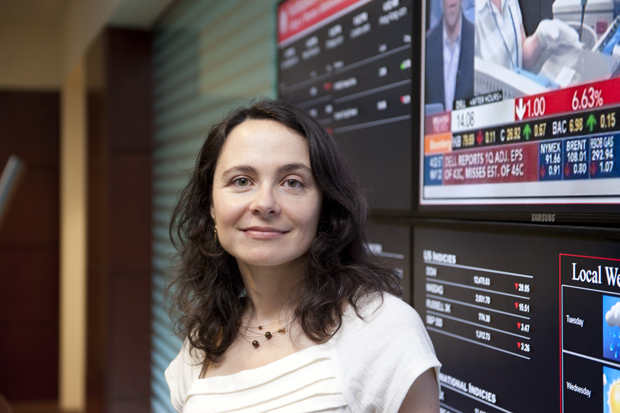3Qs: Stocking up on Facebook?

Facebook began publicly trading its stock on Friday, following significant hype over the social media giant’s IPO. While Facebook did earn the title of largest technology IPO in U.S. history, many analysts found the IPO dismal because it did not generate much profit. In the day since trading opened, Facebook’s stock price has continued to decline. We asked Tunde Kovacs, assistant professor of finance in the College of Business Administration, to explain what happened in Facebook’s highly anticipated IPO and the challenges of valuing social media companies.
Why has Facebook’s stock price fallen in its first three days of public trading, and are you surprised by this?
The fall in price is surprising because it’s not typical for a new issue. The average IPO closes the first day of trading 12-15 percent higher compared to the offer price, and some IPOs close way up: Groupon’s price closed up 30 percent and LinkedIn’s closed up over 100 percent. Facebook’s price decline comes after the company increased the expected offer price range from $28-$35 to $34-$38, which is usually a good sign, and increased the offer size by 25 percent indicating strong demand.
There were, however, some signs that the price may fall. Often when you see spectacular returns in the first few days of trading, it has to do with a market segmentation effect: Retail investors get little chance to buy shares directly from the underwriter at the offer price, so they buy in the first few days of trading, pushing the price up. This effect was dampened for Facebook because 25 percent of shares in the IPO were directly reserved for retail investors.
Second, an unusually large number, almost 60 percent, of shares sold in the IPO were shares sold by Facebook’s private investors and only 40 percent of the capital raised went to the firm. This might be an indication that Facebook does not have good investment opportunities.
Another contributing factor — one could speculate — is the unusually low fee Facebook paid to its underwriters. Usually underwriters provide a price support service by agreeing to purchase shares in the first few days of trading to prevent the kind of drop we saw for Facebook. The agreement about the services expected from the underwriters is not public, but we all know that you get what you paid for.
Finally, there was some negative news coming out in the days just prior to the offer. GM decided to pull its ads from Facebook because it found them ineffective, and as we learned on Tuesday the lead underwriter, Morgan Stanley, released a downward revised revenue forecast to institutional investors just prior to the offer.
One financial analyst called valuing Facebook “more art than science” at this stage of its development. What are the greatest challenges in valuing Facebook and other social media companies, and do you expect these challenges to grow or decline as the medium ages?
There are three major areas of uncertainty for valuing Facebook. First, will the revenues from the current business model (mainly advertising and gaming) continue to rise? Second, will the rapid shift to mobile technology hurt advertising revenue? Finally, what other areas will Facebook invest in for the future? As time goes by, we will certainly learn more about each of these issues.
Looking beyond the stock price itself, what benefits will going public provide to Facebook as a business?
Going forward, it should be much easier for Facebook to raise capital in the public markets. Given that the company hardly has a cash shortfall, the largest beneficiaries here will be Facebook’s private shareholders, not the company itself. According to Facebook’s prospectus, one of the main reasons for public listing was to “facilitate an orderly distribution of shares for the selling stockholders,” including employees with stocks and option compensation. In the medium term [six months to a year], I expect to see a continued sellout from current shareholders — nothing unusual for a newly listed public company.





